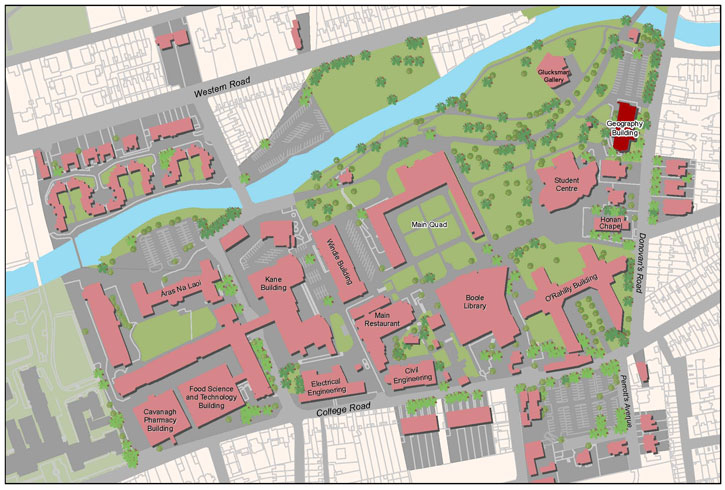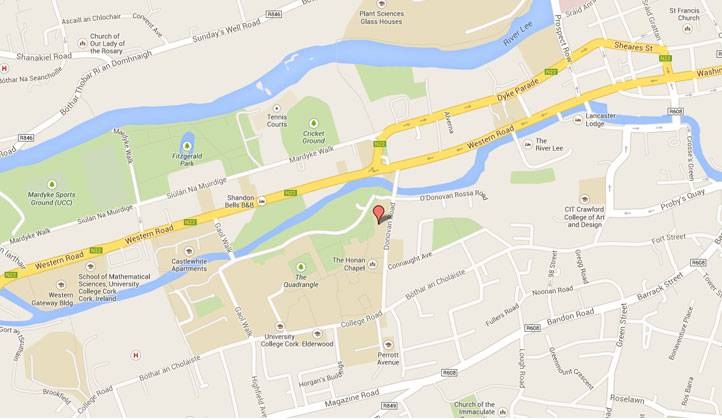About the Department

About The Department
The Department of Geography at University College Cork (UCC) is a place of teaching, research, and public engagement.
The primary remit of the Department of Geography is to study the interlinked relationships between people and the environment across a wide range of geographical topics. Through our teaching and research, we aim to challenge both ourselves and our diverse student body to achieve new methods of analysing, representing, and understanding the interconnected geographies of the environmental and anthropogenic transformations across the Earth.
Our staff are engaged with research that connects to many pressing issues related to climate change, biodiversity, inclusion and diversity, social and spatial inequalities, migration and geopolitics, among others, and are actively involved in shaping geographical debates in these areas. The geography department values diversity. Our departmental team consists of people with diverse circumstances, and caring responsibilities, including those who have had career breaks or work part-time. We value diverse career trajectories and are committed to improving equality, diversity and inclusion within all our departmental activities.
Our faculty are engaged in a variety of local, national, and international research projects with collaborations within the department, across disciplines within UCC, as well as with several external partners at various higher education institutes, research institutes, and industry organisations. Our grant portfolio includes projects supported by the Irish Research Council, COST, Horizon 2020, Science Foundation Ireland, Health Research Board, Environmental Protection Agency, Met Éireann, Teagasc, the Marine Institute, and the EU Regional Development Fund through INTEREG, as well as other funding agencies. We have published widely with award winning books, international peer-review articles, and local policy documents that communicate our research to stakeholders.
We engage with the wider UCC community through collaborations with a number of interdisciplinary research centres and institutes, including the Environmental Research Institute (ERI), the Institute for Social Science in the 21st Century (ISS21), the Future Humanities Institute (FHI) and MAREI.
We are committed to field-based, research-led and student-centred teaching and learning. Our programmes reflect our research expertise, and we train students at the crossroads of GIScience, Human Geography, and Physical Geography. Our programme uses enquiry-based and active approaches to teaching and learning to assist students to develop their own knowledge of a range of social and environmental challenges. Our aim is to enable students to have the chance to cultivate new skills to analyse environmental issues, communicate their impacts and offer sensitive solutions to manage the complex transitions ahead of us. We are committed to education for sustainable development and align our teaching, learning and research activities with the UN sustainable development goals.
At undergraduate level, the department is involved in several undergraduate streams in the university. Geography is one of the most popular subjects in the College of Arts, Social Sciences and Celtic Studies (CACSSS), with 250 students enrolled in our first-year programme. Within the BA and BA (International), students can take Geography as a major, joint, or minor honours subject. The department is a core contributor to the BSc Geosciences and forms part of the wider Environmental Sciences degree, which also includes Chemistry, Maths, Physics, Zoology, Archaeology and Plant Science. Geography also contributes electives to several programmes across the university including digital arts and humanities and public health.
At postgraduate level, the department has two taught programmes. The MSc in Applied Coastal and Marine Management focuses on the science of management and policymaking in the coastal and marine spheres, while the MSc in Geoinformatics explores the theory and uses of geographic information systems and science (GIS) and remote sensing, and applies novel spatial analysis to address a suite of geographic topics. Moreover, Geography will play a key role in the new MSc Redesigning the Post-Industrial City (RePIC), which is a two-year comprehensive masters programme aimed at responding to the challenges of post-industrial cities, delivered across eight European partners from the UNIC consortium.
Contact Us
Address: Department of Geography,
University College Cork,
Cork.
Telephone: +353 21 490 2517/2888/2804
Fax: +353 21 427 1980
Email: geography@ucc.ie


